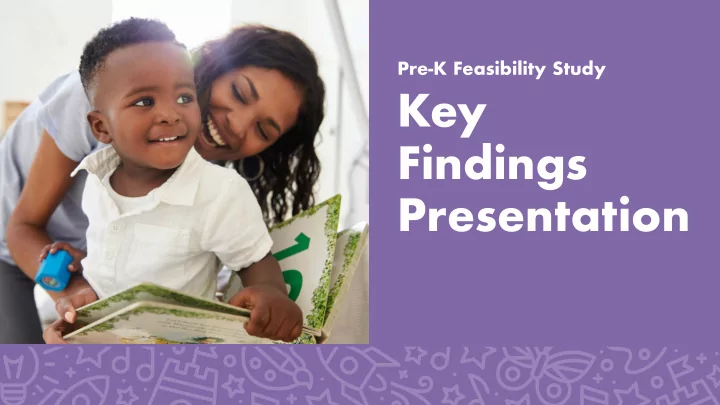

Pre-K Feasibility Study Key Findings Presentation
Pre-K Feasibility Study Partners The Pre-K Priority is a coalition of community Forsyth Futures studies our community to inform organizations and individuals committed to action by providing valuable context to community improving the number of affordable, high stakeholders and advocates. We believe that a better- quality Pre-K programs available to all four- informed community is empowered to advocate for the year-olds in Forsyth County. evidence-based policies and solutions that can improve quality of life for all in Forsyth County.
Interviews and Focus Research Groups Components Surveys Secondary Data
Young Children and Their Families
Population Projection for Number YOUNG CHILDREN AND THEIR FAMILIES of Four-Year-Olds The number of 4-year-old children is projected to increase starting in 2020. Source : North Carolina Offjce of State Budget and Management
Four-Year-Olds by Race/Ethnicity YOUNG CHILDREN AND THEIR FAMILIES The Four-Year-Old population is racially and ethnically diverse. Source: The National Center for Health Statistics. Bridged- Race Resident Population Estimates
Number of Children 0-4 YOUNG CHILDREN by Household Income, 2012-2017 AND THEIR FAMILIES About half of children 0-4 live in households making less than $45,000 a year. Source: U.S. Census Bureau; American Community Survey, Five-Year Public Use Microdata Sample, 2017
Number of Four-Year-Olds YOUNG CHILDREN Income Eligible for NC Pre-K, 2018 AND THEIR FAMILIES An estimated 2,765 Four-Year-Olds in Forsyth County meet the income eligibility for NC Pre-K. Source: U.S. Census Bureau; American Community Met Income Did Not Survey, One-Year Public Use Qualifjcations Meet Income Microdata Sample, 2018 Qualifjcations
YOUNG CHILDREN Percentage of Children 0-4 by AND THEIR FAMILIES Language Spoken at Home 2012-2017 About 22% of children 0-4 speak Spanish at home. Source: U.S. Census Bureau, American Community Survey, Five-Year Public Use Microdata Sample, 2017
Current Care Arrangements and Parent Preferences
CURRENT CARE Four-Year-Old Enrollment by Facility Type ARRANGEMENTS AND PARENT PREFERENCES About 67% of Four- Year-Olds are in some kind of formal program Source: North Carolina Child Care Statistical Report; Forsyth Futures’ Provider Survey; Family Services
CURRENT CARE ARRANGEMENTS AND PARENT ABOUT 91% PREFERENCES OF PARENTS WOULD BE VERY LIKELY TO ENROLL. Source: Forsyth Futures’ Parent Survey
Capacity and Afgordability
Enrollment and Facility Capacity CAPACITY AND Ranges by Category AFFORDABILITY There are open 91% OF FOUR-YEAR-OLDS slots, but not enough for 91% of Total Enrollment Four-Year-Olds. 2,020 TO 2,930 Target Enrollment 2,700 TO 3,860 0 1,000 2,000 3,000 4,000 5,000 Source: Forsyth Futures’ Provider Survey
Distribution of Reported Tuition Rates and CAPACITY AND Rates Parents Reported as Afgordable AFFORDABILITY $100 $200 $300 $400 $500 $600 $700 $800 FIVE-STAR The median cost of 4-year-old childcare is more LOW 25% 50% 75% HIGH than what most FOUR-STAR parents can afford. LOW 25% 50% 75% HIGH PARENTS Source: Forsyth Futures’ Parent Survey; 2017 NC State 25% 50% 75% 90% Market Rate Study COST PER MONTH
Pre-K Teachers and Assistant Teachers
There may not be enough PRE-K TEACHERS AND ASSISTANT teachers for future demand. TEACHERS There is decreasing interest Key Findings in the fjeld. Recruitment and retention may be a challenge. Financial assistance is a primary need for increasing education. Source: Forsyth Futures’ Interviews
Willingness and Ability to Participate in the Pre-K Priority
Provider Willingness and Ability WILLINGNESS to Meet Standards AND ABILITY TO PARTICIPATE IN PRE-K PRIORITY % Meeting Standard % Not Meeting but Willing w/o Resources % Willing only with Resources Source: Forsyth Futures’ Provider Survey
Providers’ Willingness and Ability WILLINGNESS to Expand AND ABILITY TO PARTICIPATE IN PRE-K PRIORITY Most sites are willing and able to expand with additional resources. Source: Forsyth Futures’ Provider Survey
Providers’ Willingness to Accept WILLINGNESS AND ABILITY TO Local Funding PARTICIPATE IN PRE-K PRIORITY Most sites are willing to accept local funding. Source: Forsyth Futures’ Provider Survey
Impacts of Pre-K Expansion
IMPACTS OF PRE-K EXPANSION Improve kindergarten readiness Hopes for more equity and Impacts Anticipated diversity in settings by the Current Community of Concerns about negative Childcare Providers impact on private providers and teachers for 0-3 Source: Forsyth Futures’ Provider Survey
IMPACTS OF PRE-K EXPANSION Consider administration, including universal application process Assess how expanded program may intersect with existing services Key fjndings from other communities Assess nature and scope of IT with expanded Pre-K support and data management Good timelines, setting priorities, community leadership Source: Interviews with other communities
SPECIAL THANKS To our funders and lead supporters.
SPECIAL Action4Equity Love Out Loud Asset-Building Coalition Megan Gregory THANKS CDSA/Amos Cottage Ministers’ Conference Centers for Exceptional Children Neighbors for Better Neighborhoods Child Care Resource Center North Point Academy Department of Public Health Novant Health Department of Social Services Partnership for Prosperity Downtown Health Plaza READ WS Family Services, Inc. Second Harvest Food Bank To those in our Financial Pathways of the Piedmont Smart Start of Forsyth County community whose First Baptist Church of Kernersville The Hispanic League support made the Forsyth County Public Library The Maya Angelou Center Habitat for Humanity Triad Moms on Main Pre-K Feasibility HandsOn Northwest NC United Way of Forsyth County Study possible. Imagine Forsyth Wake Forest Baptist Health Imprints Cares Winston-Salem Foundation Kaleideum Zina Johnson Knollwood Baptist Church La Petite Academy Latino Community Services
Pre-K Feasibility Study Key Findings Presentation
Recommend
More recommend